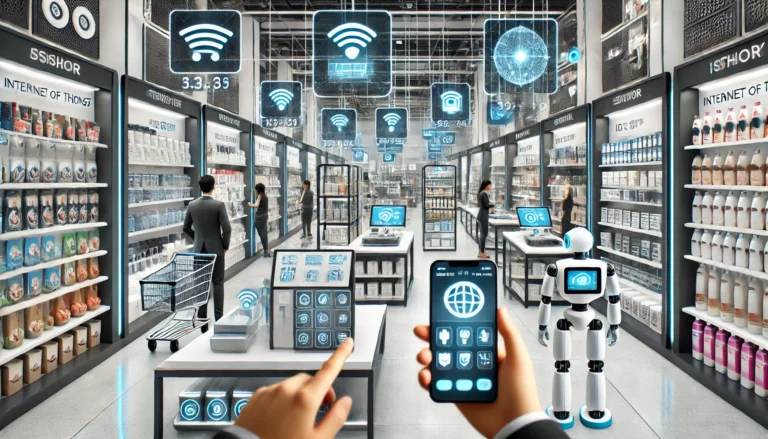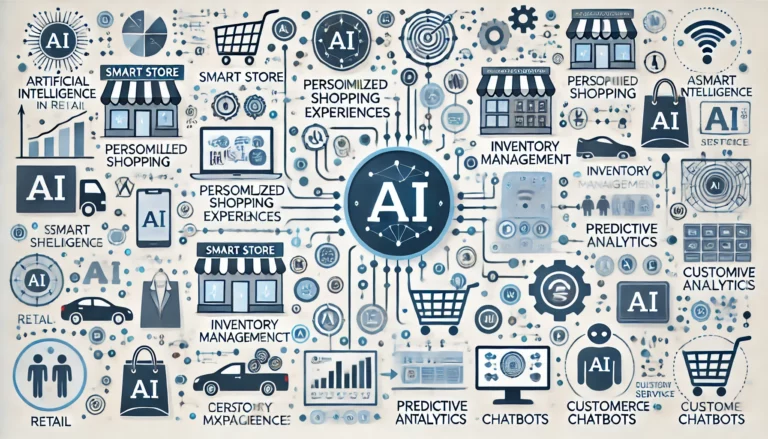Top 10 AI Technologies Transforming Retail
Table Of Contents
Discover the Top 10 AI Technologies Transforming Retail Today
Key Takeaways
- Leading AI advancements reshaping the retail sector and a summary of artificial intelligence applications in commerce.
- Tailoring experiences for consumers using intelligent systems.
- Breakthroughs in stock control and resource management.
- Improved client support through artificial intelligence solutions.
- Optimization of distribution networks powered by AI capabilities.
- Technologies for image recognition enhancing customer interactions.
- Trends in voice-activated shopping experiences.
- Strategies for identifying and mitigating fraudulent activities.
Top 10 AI Technologies Transforming Retail | Overview of AI in Retail
The retail industry is undergoing a significant transformation driven by AI technology. Businesses are increasingly recognizing the importance of integrating advanced tools to stay competitive and meet evolving consumer expectations. Among the Top 10 AI Technologies Transforming Retail, innovations in personalization, inventory management, and customer engagement are leading the charge. By leveraging AI, retail businesses can enhance operational efficiency, optimize supply chains, and create customized shopping experiences that resonate with their customers. As the landscape continues to evolve, embracing these technologies is crucial for retail businesses aiming to thrive in a dynamic marketplace.
| AI Technology | Application in Retail | Benefit |
|---|---|---|
| Personalization Engines | Customized product recommendations based on browsing history | Increased customer satisfaction and sales conversion rates |
| Chatbots | 24/7 customer service for answering queries | Enhanced customer engagement and reduced operational costs |
| Inventory Management Systems | Real-time tracking and demand forecasting | Improved stock availability and reduced waste |
| Visual Search Technology | Allowing customers to search for products using images | Streamlined shopping experience and increased product discovery |
| Dynamic Pricing Tools | Adjusting prices in response to market demand | Maximized revenue and competitive pricing strategies |
Top 10 AI Technologies Transforming Retail | Importance of AI Adoption
The adoption of AI technologies has become crucial for retailers aiming to stay competitive in evolving retail spaces. The Top 10 AI Technologies Transforming Retail provide innovative solutions that enhance customer experiences, streamline operations, and improve inventory management. Retailers leveraging these technologies can gain valuable insights into consumer behavior, enabling them to tailor their offerings more effectively and meet the demands of their customers.
AI serves as a catalyst for innovation across various sectors within retail. Retailers that embrace the Top 10 AI Technologies Transforming Retail are not just optimizing their operations; they are also setting new standards for personalized experiences. Technologies like machine learning and predictive analytics empower retailers to anticipate trends and respond swiftly to market changes, ensuring they maintain a competitive edge in the ever-changing landscape of retail.
Current Trends in Retail Technology
The retail sector is undergoing significant transformation, driven by the integration of artificial intelligence (AI). Online retailers increasingly adopt AI strategies to enhance customer engagement and streamline operations. Among the Top 10 AI Technologies Transforming Retail, generative AI stands out for its ability to create personalized content and product recommendations, making the shopping experience more relevant and enjoyable for consumers.
Retailers are also leveraging advanced data analytics to better understand consumer behavior. This trend allows them to optimize inventory management and improve decision-making processes. Implementing these technologies enables retailers to respond swiftly to market changes and consumer demands, solidifying their competitive edge in an evolving landscape. As AI continues to shape the industry, staying informed about the Top 10 AI Technologies Transforming Retail becomes crucial for success.
Personalization through AI
Customized shopping experiences are rapidly becoming a key differentiator for online retailers in the competitive landscape of ecommerce platforms. The integration of learning technologies and AI tools allows businesses to analyze customer behavior and preferences, tailoring recommendations that drive sales. By leveraging the insights derived from the Top 10 AI Technologies Transforming Retail, brands are able to create personalized journeys that resonate with individual shoppers. This approach not only enhances customer satisfaction but also cultivates loyalty, making personalization an essential strategy for success in today’s retail environment.

Benefits of Customized Shopping Experiences
Customized shopping experiences have become essential in the retail landscape, driven by the Top 10 AI Technologies Transforming Retail. These technologies enable retailers to leverage artificial intelligence for tailoring product recommendations based on individual preferences and behaviors. By analyzing vast amounts of data, businesses can optimize product lifecycle management to ensure customers find relevant items, enhancing their online shopping experience and increasing conversion rates at the point-of-sale.
Automation plays a crucial role in creating these personalized experiences. Through AI-driven algorithms, retailers can predict consumer needs and deliver targeted promotions, ultimately driving customer loyalty. The integration of these advanced technologies not only streamlines inventory management but also allows for a seamless interaction between the customer and the brand. This alignment is vital in a competitive marketplace, highlighting the importance of the Top 10 AI Technologies Transforming Retail in redefining customer engagement.
Tools for DataDriven Recommendations
Data-driven recommendations play a crucial role in enhancing the shopping experience for consumers. Retailers harness information from various sources, including customer behavior, purchase history, and current trends in merchandising. These insights allow businesses to tailor marketing strategies that resonate with individual preferences. The integration of augmented reality in shopping carts further enriches this personalized experience, enabling customers to visualize products in their own environments before making a purchase.
With the emergence of the Top 10 AI Technologies Transforming Retail, businesses can leverage advanced algorithms to analyze vast datasets efficiently. This capability not only improves product recommendations but also drives higher conversion rates. By understanding customer needs and preferences, retailers can optimize inventory management and ensure that the right products are available in-store, enhancing both the customer journey and overall sales performance.
Inventory Management Innovations
Efficient inventory management is critical for optimizing the supply chain and enhancing customer satisfaction in ecommerce. Machine learning algorithms play a pivotal role in transforming how retailers manage stock levels and anticipate demand. By utilizing insights derived from predictive analytics, businesses can streamline their value chain processes, ensuring that products are available when customers need them. The integration of these innovative technologies is among the Top 10 AI Technologies Transforming Retail, providing firms with the tools to reduce excess inventory while improving service levels. This strategic application of AI not only enhances operational efficiency but also drives profitability in a competitive market.
Predictive Analytics in Stock Control
Retailers are increasingly turning to advanced algorithms as one of the Top 10 AI Technologies Transforming Retail. These algorithms leverage machine learning to analyze historical sales data and consumer buying patterns. Retailers can better predict stock levels according to fluctuating demand, ensuring that they meet customer needs without overstocking. This approach not only optimizes inventory management but also contributes to more strategic pricing decisions.
The ability to anticipate consumer preferences and stock requirements has become essential in today’s competitive landscape. Implementing predictive analytics allows retailers to respond proactively to market trends. This technology assists businesses in aligning their inventory with customer expectations, enhancing the overall shopping experience. By harnessing the power of machine learning, companies can minimize waste and adjust their strategies based on real-time insights, solidifying their position among the Top 10 AI Technologies Transforming Retail.
RealTime Inventory Tracking Solutions
Efficient inventory management is crucial for retailers looking to optimize their operations. Real-time tracking solutions leverage data to provide instant updates on stock levels and product availability. As a result, organizations can minimize stockouts or overstock situations. Research indicates that companies integrating these systems see significant improvements in overall efficiency. These advancements are among the Top 10 AI Technologies Transforming Retail, allowing retailers to respond quickly to consumer demands.
Leveraging AI in real-time inventory tracking also enhances supply chain operations. Retail equipment equipped with sensors allows for automatic updates, making it easier to manage inventory across various locations. The integration of chatbots can further streamline this process by assisting employees in accessing inventory data instantly. By keeping pace with these innovations, retailers can ensure they remain competitive in a rapidly evolving marketplace. The impact of these technologies is undeniable, contributing significantly to the Top 10 AI Technologies Transforming Retail.
Enhanced Customer Service with AI
The integration of AI-driven transformation in the retail sector is revolutionizing customer service, proving to be one of the Top 10 AI Technologies Transforming Retail. Retail professionals are leveraging AI/ML technologies to enhance interactions and streamline processes within the retail value chain. Tools like chatbots and virtual assistants not only provide instant support but also gather valuable insights from customer interactions. This shift towards smarter, more responsive service is essential for meeting the evolving demands of consumers, making it a cornerstone of success in today’s competitive retail landscape. AI’s role in customer feedback analysis further amplifies this impact, allowing retailers to tailor their strategies to better serve their clientele.
| AI Tool | Application | Benefits |
|---|---|---|
| Chatbots | Customer support and inquiries | 24/7 availability, quick response times |
| Virtual Assistants | Personalized shopping experiences | Enhanced customer engagement, tailored recommendations |
| Sentiment Analysis | Customer feedback review | Real-time insights, improved service strategies |
| Predictive Analytics | Inventory management and demand forecasting | Reduced stockouts and overstock situations |
Chatbots and Virtual Assistants
The implementation of intelligent conversational agents is revolutionizing retail operations. Retail leaders are increasingly turning to these tools to enhance customer engagement and streamline service processes. By offering 24/7 support and instant responses, they ensure that customer queries are addressed promptly, contributing to overall retail success. This innovation ranks among the Top 10 AI Technologies Transforming Retail due to its ability to reduce wait times and improve customer satisfaction on retail sites.
Retail executives recognize the potential of virtual assistants to analyze customer interactions and gather valuable data. This analysis helps in understanding consumer behavior patterns, enabling a more tailored shopping experience. As platforms become more sophisticated, the integration of chatbots ensures that retail businesses remain competitive while achieving efficiency. This trend continues to solidify its position among the Top 10 AI Technologies Transforming Retail, ultimately facilitating a more adaptive and responsive retail environment.
AI in Customer Feedback Analysis
The retail landscape is evolving rapidly, with many retailers turning to ai-powered software to derive actionable insights from customer feedback. These AI-driven ecommerce solutions enable brands to analyze vast amounts of data quickly, transforming customer opinions into valuable assets. Understanding customer sentiment plays a crucial role in enhancing the overall retail journey, allowing companies to meet consumer demands more effectively. This reliable feedback loop helps businesses adapt their strategies in real time, ensuring they remain competitive in a crowded market.
Utilizing AI in customer feedback analysis offers retailers the ability to identify trends and patterns that may go unnoticed through manual processes. By leveraging the Top 10 AI Technologies Transforming Retail, companies can harness sophisticated algorithms to process reviews, social media mentions, and survey responses. This analysis not only boosts customer satisfaction but also aids in fine-tuning marketing efforts and product development. Employing such technologies creates a more responsive retail environment, ultimately driving growth and loyalty among consumers.
AIPowered Supply Chain Optimization
Supply chain optimization is increasingly vital for specialty retailers navigating the complexities of digital shopping. The integration of new technologies showcases the evolution of technology levels, allowing businesses to harness advanced AI/ML capabilities. As part of the Top 10 AI Technologies Transforming Retail, these innovations drive efficiencies in inventory management and logistics. By leveraging predictive analytics and real-time data insights, retailers can streamline operations, reduce costs, and enhance customer satisfaction. Embracing these cutting-edge tools is essential for maintaining a competitive edge in today’s market.
Demand Forecasting Techniques
Accurate demand forecasting is essential for retail associates to ensure that products are available when customers want them. By utilizing ai-powered cameras and smart shelves, retailers can automate inventory management processes and gain real-time insights into consumer behavior. This data-driven approach not only enhances the efficiency of supply chains but also empowers specialty retailers to respond swiftly to changing market dynamics. As one of the Top 10 AI Technologies Transforming Retail, these techniques lead to improved accuracy in predicting product demand.
Retailers are increasingly adopting advanced algorithms to analyze historical sales data and identify trends. These AI-driven models consider various factors, such as seasonality and promotional strategies, to refine forecasts continuously. The integration of smart technology with traditional retail practices is transforming the way businesses manage their stock levels, ultimately driving higher customer satisfaction. Embracing these innovations is vital for retailers aiming to stay competitive in a rapidly evolving marketplace, highlighting their importance among the Top 10 AI Technologies Transforming Retail.
Reducing Operational Costs with AI
AI technologies play a pivotal role in helping ecommerce retailers streamline operations and cut costs. By integrating AI/ML projects, businesses can utilize advanced analytics to optimize inventory levels and reduce waste. These ai-related advances not only enhance supply chain efficiency but also improve overall profitability. Companies leveraging product recommendation technology can further drive sales and minimize unnecessary expenditures associated with unsold stock, making them more agile in a competitive market.
Implementing AI-powered search personalization allows retailers to enhance customer engagement while minimizing marketing costs. This targeted approach ensures that customers receive tailored recommendations, which can lead to higher conversion rates. As businesses embrace the Top 10 AI Technologies Transforming Retail, they can significantly lower operational costs and foster a more effective business model focused on sustainable growth and efficiency.
Visual Recognition Technologies
The integration of machine learning technologies has significantly impacted how mass merchant retailers engage with consumers. By harnessing image recognition capabilities, retailers can enhance the shopping experience, enabling customers to search for specific products effortlessly. These innovations are among the Top 10 AI Technologies Transforming Retail, as they allow retailers to capture sales more effectively by responding to customer needs in real time. With ai/ml tools, retailers not only streamline the shopping process but also gather valuable insights into consumer preferences, ultimately driving profitability and customer satisfaction.
Image Recognition for Product Searches
The integration of image recognition technology into retail has revolutionized the way shoppers discover products. This functionality allows users to upload or capture images of items they want, enabling retailers to generate tailored product recommendations instantly. By leveraging the capabilities of machine learning products, retailers can enhance the shopping experience, ultimately driving sales and increasing customer satisfaction. As such, image recognition stands out as one of the Top 10 AI Technologies Transforming Retail.
Retailers can also incorporate ai-powered chatbots alongside image recognition to provide a seamless shopping experience. Customers can engage with chatbots for assistance while browsing through visually similar products or recommendations based on their searches. This combination not only streamlines the purchasing process but also supports retailers in gathering valuable insights on consumer preferences, further solidifying their place among the Top 10 AI Technologies Transforming Retail.
Augmented Reality Shopping Experiences
The integration of augmented reality (AR) within retail is among the Top 10 AI Technologies Transforming Retail. This technology allows customers to engage with products in an immersive shopping environment, enhancing their overall shopping experiences. Through AR applications, shoppers can visualize how items like furniture or clothing will look in their own space or on their person, providing a unique transformation in how they interact with stores. Retailers are increasingly recognizing the potential of AR to create memorable and engaging shopping experiences that drive customer satisfaction and loyalty.
As industry leaders adopt these innovations, the competition to create standout AR experiences intensifies. Retailers are leveraging AR tools to personalize interactions, helping customers make informed purchasing decisions. As part of the Top 10 AI Technologies Transforming Retail, AR not only enhances product visibility but also fosters a sense of connection between consumers and brands. This transformation represents a significant shift in traditional retail, making it essential for businesses to explore and implement AR solutions in their strategies.
- Enhanced product visualization improves customer confidence in purchasing decisions.
- AR applications can offer personalized recommendations based on user preferences.
- Virtual try-ons for clothing and accessories increase engagement and reduce return rates.
- Interactive store layouts can guide customers to products of interest more efficiently.
- AR experiences can blend online and in-store shopping for a seamless experience.
- Retailers can collect data on customer interactions with AR to refine marketing strategies.
- Innovative AR features can differentiate brands and foster customer loyalty.
Voice Commerce Trends
The rise of voice commerce is revolutionizing how shoppers interact with brands, marking a significant shift within the ecommerce industry craziness. By leveraging voice assistants, industries can offer a hands-free shopping experience that simplifies the purchasing process. This trend showcases one of the top ten use cases among the Top 10 AI Technologies Transforming Retail, enhancing convenience and accessibility for consumers. As more shoppers adopt smart speakers, retailers can expect to see increased engagement and streamlined transactions, affirming the growing importance of voice technology in the future of retail.
Incorporating Voice Assistants for Shopping
Voice assistants are rapidly becoming integral to the shopping experience, especially for online shoppers seeking convenience. Ecommerce companies leverage these technologies to simplify interactions, allowing users to search for products using natural language. By providing personalized product recommendations, merchants enhance customer satisfaction and engagement, making it easier for consumers to discover new items. This seamless integration reflects the impact of the Top 10 AI Technologies Transforming Retail on how people shop today.
The reliance on voice assistants not only streamlines the purchasing process but also fosters a more interactive shopping environment. By utilizing voice-activated devices, customers can receive real-time updates about orders and promotions. As ecommerce companies adapt their strategies to include these tools, they strengthen their market position and appeal to a tech-savvy audience. This evolution demonstrates the transformative power of the Top 10 AI Technologies Transforming Retail in enhancing the overall shopping experience.
Growth of Smart Speakers in Retail
Smart speakers are rapidly becoming a major player in the retail environment, aligning perfectly with the Top 10 AI Technologies Transforming Retail. These devices offer modern consumers a hands-free shopping experience that caters to their busy lifestyles. By integrating with retail platforms, smart speakers enable voice-activated commands for product searches, making it easier for users to discover items and receive recommendations tailored to their preferences. This innovation contributes significantly to hyper-personalized shopping experiences, enhancing customer engagement and satisfaction.
Retailers are leveraging smart speakers as part of their ai-facilitated tactics to streamline store operations and interact directly with shoppers. Through voice technology, customers can inquire about product availability, make purchases, or track their orders with simple voice commands. This transformation not only reflects the changing demands of consumers but also showcases how businesses are adopting the latest AI advancements to stay competitive. As the landscape of retail evolves, smart speakers are likely to play an increasingly vital role in shaping the future of customer interaction.
- Smart speakers facilitate seamless voice searches for products, enhancing convenience for shoppers.
- Retailers can utilize smart speakers to provide real-time updates on inventory and promotions.
- Voice-activated payments simplify transactions, reducing friction in the checkout process.
- Smart speakers can gather customer feedback instantly, helping retailers improve service.
- Brands can leverage personalized voice marketing to boost customer loyalty and engagement.
- Enhanced data analytics from smart speakers provide insights into consumer preferences and behaviors.
- Integrating smart speakers with other digital platforms helps create cohesive omnichannel shopping experiences.
Fraud Detection and Prevention
The integration of AI tools in identifying suspicious transactions is essential for businesses operating in strategic industries, especially in the context of the online shopping journey. As part of the Top 10 AI Technologies Transforming Retail, these sophisticated systems analyze patterns in consumer behavior to detect anomalies and potential threats. This not only protects consumers during their personalized shopping experiences but also fosters trust in the e-commerce environment. By prioritizing fraud detection, companies can enhance their overall security while maintaining a fluid and enjoyable experience for customers, thereby solidifying their position in the competitive retail landscape.

AI Tools for Identifying Suspicious Transactions
The rise of fraudulent activities in the retail sector has prompted the adoption of advanced AI tools, making them crucial for maintaining security. Retailers are increasingly leveraging these technologies to analyze transaction patterns and detect anomalies effectively. By incorporating these solutions, businesses can address their ecommerce needs while ensuring that customers feel secure with their purchases. These tools not only enhance online security but also align with the Top 10 AI Technologies Transforming Retail.
AI-driven algorithms can systematically evaluate vast amounts of data, pinpointing suspicious transactions before they escalate. This capability allows stores to automate much of their fraud detection processes, which saves time and resources. As a result, retailers can focus on providing detailed product information and improving customer service, ultimately creating a more positive shopping experience. Embracing these tools reflects a broader trend in the retail landscape, showcasing the impact of the Top 10 AI Technologies Transforming Retail.
Conclusion
The Top 10 AI Technologies Transforming Retail are reshaping the landscape of the industry, enhancing business operations and customer experiences alike. These specialized systems streamline the management of items, allowing retailers to respond more effectively to consumer demands. By integrating AI tools, businesses can deliver tailored services and anticipate customer preferences, ultimately driving sales and satisfaction. The adoption of these technologies is not just a trend; it is a crucial step for retailers aiming to thrive in an increasingly competitive market. Embracing the Top 10 AI Technologies Transforming Retail positions businesses at the forefront of innovation, ensuring they meet the evolving needs of their customers.
FAQS
How can Google assist specialty retailers in creating immersive shopping experiences for specific products that shoppers are looking for?
Google offers various ecommerce tools that help retailers capture sales by enhancing their online presence, making it easier for specialty retailers to provide immersive shopping experiences tailored to specific products that shoppers desire.
What innovative strategies can speciality retailers employ to better connect with specific products shoppers are interested in?
Specialty retailers can leverage data analytics and personalized marketing strategies to enhance customer engagement with specific products shoppers are looking for. By using targeted promotions and tailored recommendations based on shopping behavior, they can create a more appealing shopping experience that resonates with their customers’ interests in specific products.
What role do speciality retailers play in the integration of AI technologies in retail?
Speciality retailers are increasingly adopting AI technologies to enhance customer experiences, optimize inventory management, and improve personalized marketing efforts. By leveraging data-driven insights, speciality retailers can better cater to their target audience and stay competitive in the evolving retail landscape.
What are the primary benefits of utilizing AI technologies for enhancing customer engagement in retail settings?
Utilizing AI technologies in retail settings primarily enhances customer engagement by providing personalized shopping experiences, improving inventory management, and facilitating data-driven marketing strategies.
How are AI technologies revolutionizing the shopping experience for consumers in retail?
AI technologies are revolutionizing the shopping experience for consumers in retail by providing personalized recommendations, streamlining inventory management, enhancing customer service through chatbots, and optimizing the overall shopping journey. These advancements lead to improved customer satisfaction and increased sales for retailers, making AI an essential component of modern retail strategies.






